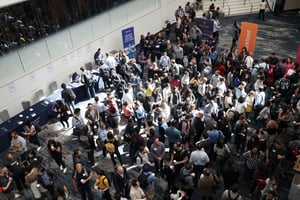Whether it is CES or AAPEX, setting up a booth at a trade fair has long been a great way to...
Engineering Your Career for Emerging Technologies
In October 2019, Google’s quantum computing team reported a breakthrough in quantum computing. Their newest system managed to complete a calculation in 3 minutes and 20 seconds that a traditional supercomputer would need 10,000 years to complete. Quantum Computers use quantum-mechanical phenomena such as superposition and entanglement to perform computations instead of electrically gated 1s and 0s in a traditional computer. Google’s experiment was one small step toward commercializing quantum technology and it raised the possibility of breakthroughs in a number of different fields such as artificial intelligence and engineering.
Intelligence is the ability to acquire and apply knowledge and skills, and one of the barriers to creating an artificial intelligence is computing power. Quantum computing may open the door to artificial intelligence by breaking down barriers related to computational speed.
As the Google team demonstrated, quantum computing is an exponential leap in computational ability. However, recent breakthroughs in AI are primarily software advances and, the work of combining quantum computing with AI research is just beginning. Whether or not artificial intelligence or quantum computing will achieve a useful breakthrough in the near future remains to be seen, but the technologies bring to mind a career question, how do you prepare for a career filled with technological uncertainty?
The Two Most Important Skills to Carry Your Career into the Future
Imagine a student’s engineering career beginning this year, in 2020, and continuing until average retirement age (currently about 67-years-old). If our student is 22 right now, she potentially has a 45-year career ahead of her, and she will retire around the year 2065. How might computing and AI affect a career in the course of the next 45 years, especially in the face of exponential advancements?
In the next 10-20 years, most advances in computing and AI will augment human intelligence, meaning basic tasks and everyday challenges will be solved with computers and robotics. It will make engineers’ jobs easier and improve their ability to solve more difficult problems. It is also likely to increase the demand for individuals who are able to learn quickly, become proficient in new technologies, and apply them to real world problems. The meta skills of success in the future will not be technical skills—they will be creativity and the ability to learn quickly.
These two skills will differentiate you in every aspect of the future and help insulate you from the inevitable effects of technological changes.
Careers vary widely, but the trends are useful to consider. A traditional career timeline starting in 2020 will follow a predictable path with some variation, particularly in the early years:
- 2020 Graduation – Begin to learn the engineering profession
- 2024 – Eligible for PE testing and License
- 2028-2030 – Begin to take on team leadership roles
- 2030+ Specialization and/or management roles
What will computing and AI look like in 2030 and 2045? If Ray Kurzweil, Google’s director of engineering is correct, computers will achieve human levels of intelligence by 2029, and the Singularity will follow around 2045.
The Singularity is a concept describing a cross-period of time when humans transcend their biology by combining their consciousness with computers. The theory posits that homo sapiens will evolve and become something completely new. Granted, this idea includes a cybernetic aspect currently beyond the ability of science.
How the Singularity will occur, if at all, and what it means for humanity is a topic of debate. Even if it does not occur, the relentless improvement of computing and AI will have a major impact on many professions, especially high-tech fields such as engineering. Computational improvements are inevitable; but what remains unclear is if computers will ever be able to replicate the human imagination. If it is possible, it will possibly take longer to accomplish than Kurzweil calculated. In either case, engineers who approach difficult problems with imagination will be in great demand.
As quantum computing and AI become more useful and practical tools for everyday life, they will free up intellectual capital, and teams of people will push the more imaginative, heavy work. For example, NASA’s moon landing was accomplished without the aid of advanced computers. Computing was still in its infancy in the 1960s, and many of the calculations were done by hand using nothing more than slide rulers.
An enormous amount of intellectual effort was invested in what today’s computers accomplish in a fraction of one-second. Future projects, of the same scope and breadth as the moon landing, such as the colonization of Mars and other visionary projects, will require much less human computational effort and more imagination. Creativity will become (if it is not already) the key differentiating skill of engineers. It will become the intellectual superpower of humanity.
The key lesson is that while building your career in the coming decades, do not underestimate the importance of soft skills such as creativity and learning.



